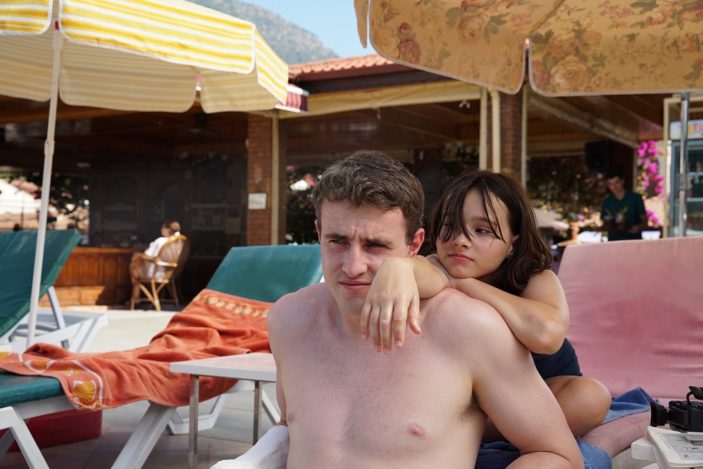
The plot for Aftersun is one that we have seen countless times before in one form or another: Adult reflects on a childhood trip with a parent that was often laced with memorable experiences. It’s how writer/director Charlotte Wells chooses to frame such a story though – almost like a faded memory – that transforms proceedings into something that imbeds itself in our psyche, refusing to let go for long after this deceptively haunting film has closed.
The film incorporates a 90’s style camcorder device in order to frame its period setting, informing us this is a reflection for young Sophie (Frankie Corio, sublime), an 11-year-old whose holiday with her father, Calum (Paul Mescal, devastatingly good), to a budget Turkish resort was seemingly their last holiday together; brief flashes featuring an adult Sophie (Celia Rowlson-Hall) suggesting it had a lasting impact beyond what we initially assume.
From the opening moments of Aftersun, Calum is bathed in a mysteriousness that adds a certain level of anxiety to the narrative. There’s always a sense of dread lingering, and Wells ultimately alluding to Calum’s early death doesn’t help that unease either; a scene where Sophie is sleeping in the foreground whilst Calum occupies himself on the hotel balcony just out of focus seems purposefully structured for the audience to constantly worry whilst watching.
Aftersun is an exercise is subtly playing with our emotions and expectations. The cast on Calum’s arm in the film’s early stages is unexplained, but a multitude of reasons come to mind (self-harm being one of the most prevalent), and his overall unreliability leans into our understanding as to why he and Sophie’s mother are divorced. We’re always predicting the worst for both characters – Sophie walking off on her own after they spat over Calum refusing to partake in the resort’s karaoke night is another uncomfortable moment – and the more the film embraces their push-pull dynamic, the more we understand the glimpses of present-day Sophie, dancing in a strobe-lit rave hall, letting her father go in a burst of imagery that has both literal and metaphorical connotations that will long be debated after the credits roll; the audience I saw this with sat in absolute silence and stillness.
The film’s emotional power truly comes to the forefront in its latter half, with certain puzzle pieces finally coming together as Wells demonstrates the innocence of Sophie’s youth was always masking her father’s pain. Whether recognised or not, Calum imprinted on her soul in enough of a capacity for her to carry both their burdens moving forward. That in of itself is Aftersun‘s most tragic ingredient.
![]()
![]()
![]()
![]()
![]()
FIVE STARS (OUT OF FIVE)
Aftersun is now screening in Australian theatres.
Aftersun was originally reviewed as part of our 2022 Brisbane International Film Festival coverage.
